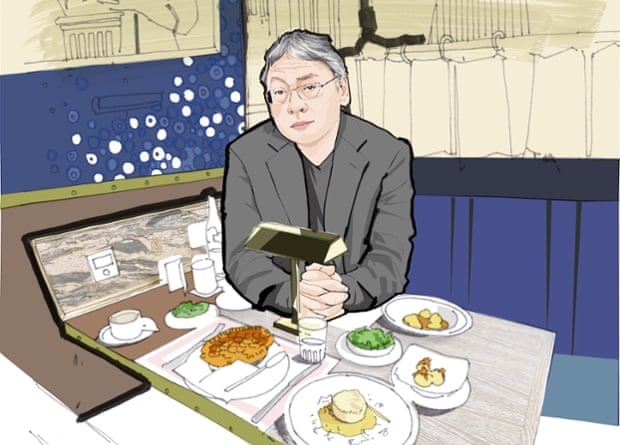The novelist on self-reinvention, writing lyrics and his new book The Buried Giant

Bob Bob Ricard, Kazuo Ishiguro’s favourite London restaurant, on the corner of Beak Street, Soho, has upholstered booths that make it look like a luxurious railway train – the Orient Express, perhaps. We settle in at 1.30pm for what will turn out to be a long journey, with a conversation sprawling, various and with multiple destinations. Ishiguro sits opposite in his habitual uniform of black jacket and shirt. His hands are expressive and he steers the conversation with such freedom that questions seem cumbersome interventions. He has claimed he is not a novelist reliant on observation (his Booker-winning novel The Remains of the Day and 2005 sci-fi hit Never Let Me Go share a “tweaked” reality). Yet he is all attention – a good watcher and listener.
Before we get on to his seventh novel, The Buried Giant, “Ish”, as he tends to be called, wants me to admire the plug socket next to him. With a child’s delight, he reports that this restaurant once him served afternoon tea and plugged in a toaster at his table. Even better, I suggest, is the bell at my elbow instructing, as if anticipating an emergency: “Press for champagne”.
I confess to Ishiguro straightaway that I approached his new novel nervously. I have a blind spot about Arthurian legend and thought I might need rescuing from a novel that involves dragon-slaying and a latter-day Gawain. But I was relieved to find the book has what all his best writing possesses: an understated, enigmatic narrative, filled with melancholy truths. And Gawain, with his ancient armour and faithful horse, has a sympathetic affinity with Stephens the butler in The Remains of the Day. “There is a real dignity and a romanticism about both of them. They are pathetic and sad because they are out of time,” he says.
More
Before we get on to his seventh novel, The Buried Giant, “Ish”, as he tends to be called, wants me to admire the plug socket next to him. With a child’s delight, he reports that this restaurant once him served afternoon tea and plugged in a toaster at his table. Even better, I suggest, is the bell at my elbow instructing, as if anticipating an emergency: “Press for champagne”.
I confess to Ishiguro straightaway that I approached his new novel nervously. I have a blind spot about Arthurian legend and thought I might need rescuing from a novel that involves dragon-slaying and a latter-day Gawain. But I was relieved to find the book has what all his best writing possesses: an understated, enigmatic narrative, filled with melancholy truths. And Gawain, with his ancient armour and faithful horse, has a sympathetic affinity with Stephens the butler in The Remains of the Day. “There is a real dignity and a romanticism about both of them. They are pathetic and sad because they are out of time,” he says.
More
No comments:
Post a Comment